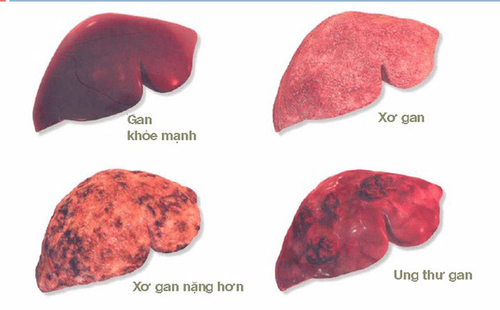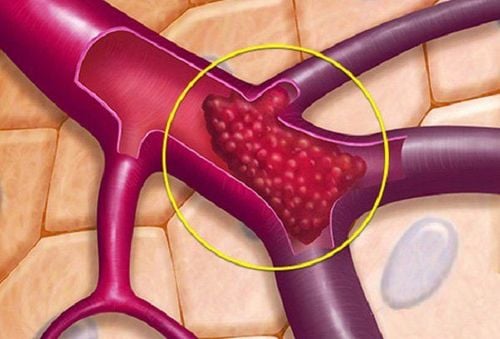This is an automatically translated article.
The liver is the organ located below the right lung, the largest organ in the body and has many important functions. Recurrent liver cancer is a dangerous disease with a high mortality rate if not detected in time.
1. What is liver cancer and recurrent liver cancer?
Liver cancer is the uncontrolled growth and development of cancer cells in the liver. People with liver cancer often have typical symptoms such as jaundice, yellow eyes; abdominal pain, right shoulder blade area, back area; unexplained weight loss; hepatomegaly, splenomegaly, or both; ascites; tired; vomiting or nausea; itching, fever; Feeling full, not eating well. These manifestations will not really be apparent until liver cancer has progressed to an advanced stage of the disease.
The stages of liver cancer are divided into 4 time periods as follows:
Stage 1: The tumor is still in the liver and has not spread to another organ or location. Stage 2: There are several small tumors that exist in the liver or one that has reached a blood vessel. Stage 3: There are many large tumors or one tumor has reached a major blood vessel. Stage 4: The cancer has metastasized, which means it has spread to other parts of the body.

Ung thư gan được chia thành 4 khoảng thời gian tương ứng với 4 giai đoạn
Recurrent cancer is a primary liver cancer that develops new cancer cells after treatment has been carried out. The condition is very common in patients with liver cancer. Although the disease has been cured, but after a period of time, it will come back, there are many cases of relapse after a long time of recovery. Therefore, recurrence of liver cancer is difficult to detect because patients are often subjective when they have been treated for this disease.
2. Causes of liver cancer recurrence after surgery
Liver cancer that recurs after surgery often has many different causes. However, the main cause of the recurrence of liver cancer after surgery is that the treatment of primary liver cancer is not carried out thoroughly. From there, cancer cells will continue to grow and cause liver cancer to return.
Liver cancer recurrence after surgery can also be encountered because during surgery, the tumor is not completely removed or chemotherapy and radiotherapy measures do not completely remove the primary liver cancer.
Some studies have noted that the body of women who have not fully recovered from liver cancer treatment and become pregnant right away also reduces immunity. Thereby creating conditions for residual cancer cells to grow, causing liver cancer to recur after surgery.

Mang thai làm tăng nguy cơ bị ung thư gan trở lại ở nữ giới
3. How is cancer recurrence diagnosed?
After treatment for liver cancer, the patient will have a plan to monitor the disease and care for the disease. This plan will include a schedule of regular visits, physical exams, and possibly other tests (if needed).
These regular visits will help the doctor find out whether the liver cancer has returned and how the patient's health is. If the patient suspects liver cancer to return after surgery, the doctor will order other diagnostic tests to make an accurate conclusion, including laboratory tests, imaging studies or biopsies. set.
4. Treatment of liver cancer recurrence after surgery
After doing the tests and identifying the patient with recurrent liver cancer, the doctor will recommend the appropriate method depending on each case. The patient may be referred for resection if possible, but recurrent liver cancer cases are often not resected. Therefore, it is common for liver cancer to recur after surgery to slow disease progression, such as chemoembolization, percutaneous ethanol injection, or chemotherapy.
During treatment for liver cancer that has recurred after surgery, patients should use palliative care therapies to relieve symptoms and side effects of cancer treatments.

Tùy thuộc giai đoạn ung thư gan tái phát để có pháp đồ điều trị thích hợp
5. Prevention of liver cancer recurrence after surgery
Recurrence of liver cancer usually occurs after the first two years of treatment, may appear at the original site or very close to it. Liver cancer that recurs after surgery can also recur in distant tissues and organs such as bone marrow, lungs, breast or brain, ... which we commonly know as metastasis or secondary liver cancer.
Usually it is difficult to detect liver cancer recurrence after surgery, because as mentioned above, patients are often quite subjective when this disease has been treated. But we can still prevent the disease by eating, living carefully and having regular health check-ups according to the schedule that the doctor requires to be able to detect the disease early and have specific treatment methods.
The danger of liver cancer has shown the importance of screening and early detection of the disease. Therefore, Vinmec International General Hospital has provided customers with a package of screening and early detection of liver cancer to screen for liver cancer for people at high risk of diseases such as: alcoholics, cirrhosis, family history of liver cancer, cirrhosis, hepatitis B virus infection, chronic hepatitis C,...
Service selection Package for screening and early detection of liver cancer, patients will be examined, consulted and performed tests, diagnostic imaging to evaluate liver function, liver diseases and liver cancer screening. With a system of modern machinery and a team of highly qualified and experienced doctors, Vinmec is committed to the best protection for the health of patients.
To learn more about liver cancer testing methods at Vinmec, please book an appointment on the website for service.
Recommended video:
What are the symptoms of high liver enzymes?
Please dial HOTLINE for more information or register for an appointment HERE. Download MyVinmec app to make appointments faster and to manage your bookings easily.
MORE
Prognosis of liver cancer treatment by stage The danger of liver cancer Why is liver cancer more common in men than in women?













